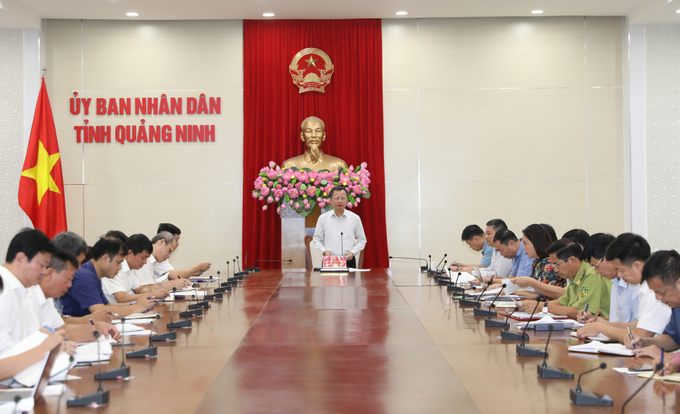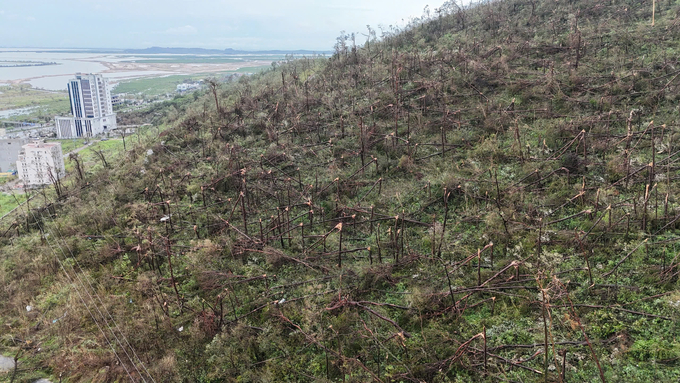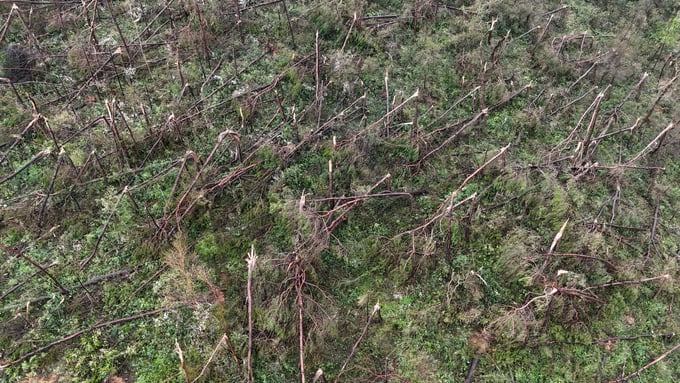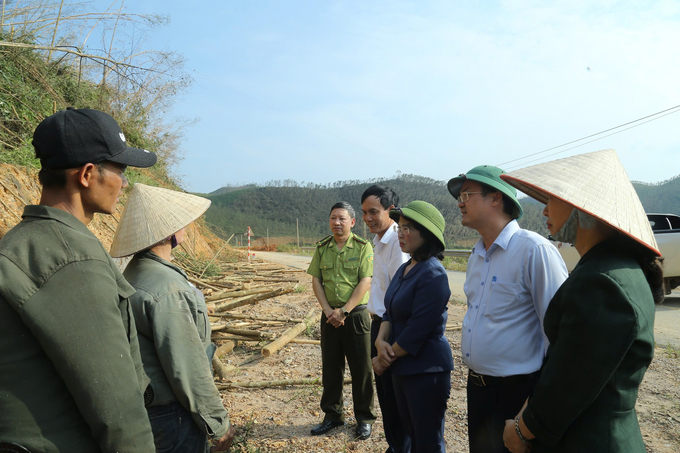May 24, 2025 | 16:20 GMT +7
May 24, 2025 | 16:20 GMT +7
Hotline: 0913.378.918
May 24, 2025 | 16:20 GMT +7
Hotline: 0913.378.918

Mr. Cao Tuong Huy, Chairman of the Quang Ninh People's Committee, chaired the meeting to discuss recovery efforts after Typhoon No. 3. Photo: Vu Cuong.
Currently, Quang Ninh province has over 434.000 ha of forests and forestry land, accounting for 70% of the province's total natural land area, with a forest coverage rate of nearly 55%. Super Typhoon Yagi, with its immense destructive power and intensity, damaged over 117.000 ha of forests in Quang Ninh, with estimated total losses exceeding 205 million USD, mainly affecting production forests.
According to reports from localities, post-storm recovery efforts are facing many difficulties, especially in collecting fallen trees due to a lack of manpower and landslides that have damaged transportation routes. Additionally, purchase prices have dropped, and there is a shortage of gathering areas. In particular, infrastructure at wood chip factories and the wood chip export facilities at ports have been severely damaged, causing significant challenges in the collection, processing and sale of timber.
Mr. Chieu Duc Thang (Don Dac commune, Ba Che district) shared that for acacia trees, prolonged collection times make it impossible to peel the bark, reducing the value of the wood. "With low acacia prices and a lack of labor, only my wife, our three young children and me, the cost of hiring workers is too high. I can't manage it alone, so I had no choice but to leave the trees", Mr. Thang said.
On September 19, the Quang Ninh Provincial People's Committee held a meeting to discuss solutions to support the consumption of storm-damaged timber from Typhoon No. 3 and to direct efforts to mitigate forestry losses. Mr. Cao Tuong Huy, Deputy Secretary of the Provincial Party Committee and Chairman of the Provincial People's Committee, chaired the meeting. Representatives from forestry companies, timber purchasing and processing units in the province also attended.

After Typhoon No. 3, the forestry sector in Quang Ninh suffered an estimated loss of 205 million USD. Photo: NT.
Based on an assessment of the damages and feedback from representatives of the affected residents and businesses involved in planting, purchasing and processing timber, various departments and agencies have proposed solutions to quickly address the post-storm losses and restore production.
In the short term, it is essential to implement the support policies outlined in Decree No. 02/2017/ND-CP dated January 9, 2017, from the government regarding mechanisms and policies to support agricultural production to recover from losses caused by natural disasters and diseases. This includes replanting damaged forests, solutions for harvesting affected plantations and strategies for selling timber from fallen trees.
Chairman of the Provincial People's Committee Cao Tuong Huy emphasized that forests not only shelter and protect people from harsh natural conditions but also provide a means of livelihood, especially for those in mountainous areas. Thousands of households have achieved stable incomes by cultivating valuable crops sourced from the forest. Therefore, to help people quickly stabilize their lives and allow businesses to restart production, Mr. Cao Tuong Huy urged localities to immediately implement support policies and initial recovery measures in accordance with government and local regulations.
Additionally, the Provincial People's Committee has worked with forces such as the police, military and forestry officials to strengthen manpower for coordinating and assisting with the collection of timber for households involved in forestry, particularly those in remote and isolated areas. They have arranged temporary storage sites for residents to gather wood during harvesting when it cannot yet be transported or sold.

117.000 ha of forests in Quang Ninh were destroyed by Typhoon No. 3. Photo: NT.
In parallel, there will be a review and monitoring of roads that are at risk of landslides to take timely measures for safety during logging. Efforts will be increased for forest fire prevention and control, especially since fallen trees are drying out due to lack of water.
For businesses and units involved in timber purchasing and processing, Mr. Cao Tuong Huy urged them to agree on a uniform price and make it public across the province. There should be solutions for handling, selling and collecting trees that are not yet ready for harvest. The approach focuses on sharing risks, where "healthy leaves support the damaged leaves" and "a few damaged leaves support many damaged leaves", to provide maximum support for the people.
Quang Ninh province has sent a document to banks to promptly resolve issues for customers, such as restructuring debts, reducing loan interest rates, providing new loans for customers without collateral, offering new loans at appropriate interest rates. This will serve as new motivation for people and businesses to restart production. The Chairman of the Provincial People's Committee has instructed relevant units to support residents and businesses in accessing banks as quickly and easily as possible.
Mr. Cao Tuong Huy also emphasized that to continue the recovery of forests, it is necessary to research and propose a restructuring of crops. Port businesses should facilitate the consumption of timber products by residents and enterprises.
Quang Ninh province will continue to compile recommendations and propose to the government policies that need support, such as expanding the eligible beneficiaries outlined in Decree No. 02/2017/ND-CP dated January 9, 2017. This includes policies on tax exemptions, fee reductions, financial obligations, as well as insurance, applying the best possible support conditions for residents and organizations to stabilize their lives and quickly restore production.

The leaders of Quang Ninh province discuss with forest growers in Ha Long City. Photo: NT.
In an interview with reporters from the Vietnam Agricultural Newspaper, Mr. Vu Duy Van, Deputy Director of the Quang Ninh Department of Agriculture and Rural Development, stated that the department has advised and proposed to the Provincial People's Committee to launch a campaign to support residents in maximizing the recovery of damaged timber.
Specifically, a 35-day-and-night campaign will be launched, mobilizing the entire political system, including local governments, armed forces, military and border guards, to assist in the collection of forest timber and to address and mitigate the consequences caused by Typhoon No. 3. The target group includes individuals and households engaged in forest production.
“During the recovery process, the Department will research restructuring crops. This involves gradually reducing the area of low-quality acacia and focusing on planting native species and large timber trees. Along with the Department, forest owners also need to review their crop structure to develop according to the province's direction. We cannot leave the land fallow for the next few years, we must start working immediately”, the Deputy Director of the Department of Agriculture and Rural Development said.
Currently, the support level under Decree No. 02 of 2017 from the government for forests that have been damaged over 70% due to natural disasters is 170 USD/ha. According to Mr. Vu Duy Van, this level of support is still modest. Each year, Quang Ninh province plants about 13.000 ha of new forest. However, Typhoon No. 3 caused damage to approximately 117.000 ha of forest, so the cost of recovery and purchasing seedlings for reforestation is significant. Quang Ninh province will provide additional support for forest growers under Resolution 37 (July 10, 2024), with a maximum of 850 USD/ha.
“The motivation to restore the forestry sector must first come from addressing the difficulties faced by forest growers through the implementation of supportive policies. The Quang Ninh Provincial People's Committee has tasked the Department with developing a project for the recovery and development of the agricultural sector after Typhoon No. 3, with a focus on forestry and aquaculture. Recovering from the consequences left by Typhoon No. 3 in the agricultural sector is a significant amount of work and will require a long-term commitment”, Mr. Van emphasized.
On September 20 and 21, thousands of officers and soldiers from the armed forces in the districts, towns and cities of Quang Ninh province coordinated with military units stationed in the area to help residents collect and harvest fallen trees to quickly restore and replant forests.
Translated by Phuong Linh

(VAN) In the tranquil wetlands of Van Long, there are quiet souls who guard the forests, nurture the waters, and oversee every bird and troop of langurs as protecting the essence of a living heritage.

(VAN) WWF, GIZ, IUCN, UNDP call for biodiversity conservation and sustainable development must be regarded as a unity in strategies for a green future.

(VAN) On celebration of International Day for Biological Diversity, Deputy Minister Nguyen Quoc Tri called for practical actions to address nature and biodiversity conservation.

(VAN) Dr. Hoang Thi Thanh Nhan – Deputy Director of the Nature and Biodiversity Conservation Agency – highlighted this on the International Day for Biological Diversity, May 22, 2025.
![Ho Chi Minh city adapts to climate change: [2] Accelerating action](https://t.ex-cdn.com/nongnghiepmoitruong.vn/608w/files/chiqk/2025/05/22/4024-4220-bien-doi-khi-hau-1-100626_766.jpg)
(VAN) Clearly recognizing the challenges posed by climate change, Ho Chi Minh city has swiftly shaped its policies and implemented practical solutions to adapt.

(VAN) Rice straw is no longer just a discarded byproduct, but it is becoming a green resource that helps farmers in the Mekong Delta reduce emissions and promote circular, sustainable agriculture.

(VAN) Other Effective Area-based Conservation Measures (OECMs) are solutions that contribute effectively to achieving the goals of the Kunming–Montreal Global Biodiversity Framework.